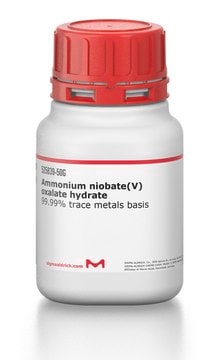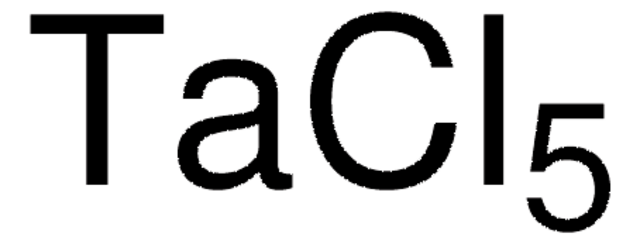339202
Niobium(V) ethoxide
99.95% trace metals basis
Synonym(s):
NbOEt, Niobium ethanolate, Niobium ethylate, Niobium pentaethoxide, Pentaethoxyniobium
About This Item
Recommended Products
Quality Level
Assay
99.95% trace metals basis
form
liquid
reaction suitability
core: niobium
refractive index
n20/D 1.516 (lit.)
bp
142 °C/0.1 mmHg (lit.)
mp
5-6 °C (lit.)
density
1.268 g/mL at 25 °C (lit.)
SMILES string
CCO[Nb](OCC)(OCC)(OCC)OCC
InChI
1S/5C2H5O.Nb/c5*1-2-3;/h5*2H2,1H3;/q5*-1;+5
InChI key
ZTILUDNICMILKJ-UHFFFAOYSA-N
Looking for similar products? Visit Product Comparison Guide
General description
Application
Because of its low boiling point and low decomposition temperature (~325-350 °C),niobium(V) ethoxide is also used as a precursor in atomic-layer deposition, chemical vapor deposition, and metal-organic chemical vapor deposition of niobium oxides.
It can also be used as a dopant to prepare Nb-doped TiO2 photoanode for dye-sensitized solar cells (DSSC). The doping of Nb lowers the conduction band of TiO2 enhancing electron injection and transfer ability of TiO2 photoanode. This results in a significant increase in the performance of DSSC.
Features and Benefits
Signal Word
Warning
Hazard Statements
Precautionary Statements
Hazard Classifications
Flam. Liq. 3
Storage Class Code
3 - Flammable liquids
WGK
WGK 3
Flash Point(F)
96.8 °F - closed cup
Flash Point(C)
36 °C - closed cup
Personal Protective Equipment
Regulatory Listings
Regulatory Listings are mainly provided for chemical products. Only limited information can be provided here for non-chemical products. No entry means none of the components are listed. It is the user’s obligation to ensure the safe and legal use of the product.
FSL
Group 4: Flammable liquids
Type 2 petroleums
Hazardous rank III
Water insoluble liquid
JAN Code
339202-VAR:
339202-BULK:
339202-50G:
339202-1G:
339202-5G:
Choose from one of the most recent versions:
Already Own This Product?
Find documentation for the products that you have recently purchased in the Document Library.
Customers Also Viewed
Articles
The prevailing strategies for heat and electric-power production that rely on fossil and fission fuels are having a negative impact on the environment and on our living conditions.
The properties of many devices are limited by the intrinsic properties of the materials that compose them.
Our team of scientists has experience in all areas of research including Life Science, Material Science, Chemical Synthesis, Chromatography, Analytical and many others.
Contact Technical Service









